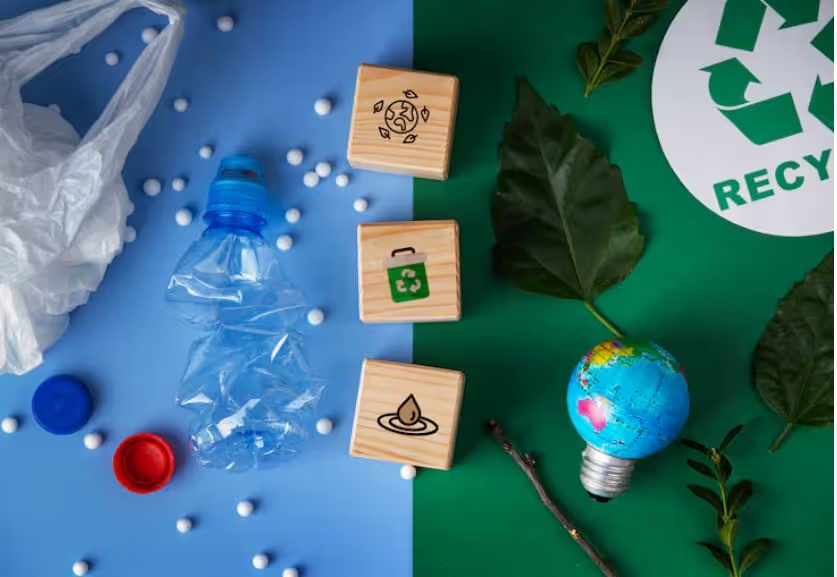Stay informed with our newsletter.
.webp)

.webp)

World Environment Day 2025 brings together individuals, communities, and organizations worldwide to take collective action against plastic pollution. This global event emphasizes the urgent need to reduce plastic waste through sustainable practices, policy changes, and increased awareness. By uniting efforts, the campaign aims to protect ecosystems, marine life, and human health from the harmful effects of plastic pollution. It calls for a shared commitment to creating a cleaner, healthier planet for future generations.

Around the world today, communities, civil society groups, businesses, and governments gathered to observe World Environment Day under the theme #BeatPlasticPollution, with official festivities taking place in Jeju Province, Republic of Korea.
Plastic pollution is a pervasive issue affecting every part of the Earth. By 2040, plastic waste entering the environment is expected to increase by 50%, contaminating our food, water, and even the air we breathe. The 2025 World Environment Day urges global cooperation to combat this growing problem, coinciding with upcoming negotiations on an international treaty aimed at ending plastic pollution.
In his World Environment Day statement, UN Secretary-General António Guterres highlighted the widespread damage caused by plastic waste, which pollutes rivers, oceans, and harms wildlife. He noted that as plastics break down into micro-particles, they invade all environments, from the highest mountains to the depths of the oceans, and even human bodies.
Guterres acknowledged the rising global movement for change, citing increased public engagement, policies targeting single-use plastics, and efforts to improve waste management. However, he emphasized the need for faster and more comprehensive action. At the official ceremony in Jeju, Lee Byounghwa, Vice Minister of Environment for the Republic of Korea, stressed the critical role governments, businesses, and citizens play in achieving a circular plastics economy. He urged people to prioritize small actions over convenience to collectively beat plastic pollution before it causes irreversible harm.
South Korea has launched ambitious initiatives to reduce plastic waste, especially in Jeju Province, which focuses on minimizing single-use plastics and promoting reuse and recycling. The province aims to eradicate plastic pollution by 2040 by encouraging residents to reject disposable plastics.
UN Environment Programme Executive Director Inger Andersen stated that ending plastic pollution is essential for human health, planetary well-being, economic stability, and business sustainability. She emphasized that recycling alone isn’t enough; tackling the entire lifecycle of plastics with circular strategies is crucial to prevent plastics from contaminating oceans, soils, and bodies. This calls for a fundamental rethink in how plastics are designed, produced, used, and reused.
Former UN Secretary-General Ban Ki-moon, writing in South Korea’s Kukmin Daily, highlighted plastic pollution as a global challenge requiring universal international cooperation. He called for World Environment Day to be a turning point for governments, civil society, businesses, scientists, and future generations to unite and take action.
Across the globe, governments, businesses, schools, and communities participated in activities to raise awareness and combat plastic pollution. In Mexico, President Claudia Sheinbaum launched a National Strategy for Beach and Coast Cleanup and Conservation (2025-2030), aiming to completely eliminate plastic waste from the nation’s coasts within five years.
Airports worldwide, including those in Baghdad, Beijing, Brussels, Geneva, and Kansai, reached millions of travelers with messages about plastic pollution. Metro stations in Beijing and Mexico City also promoted awareness, while landmark buildings in New York, Geneva, Brussels, and other cities lit up in green to honor World Environment Day.
The Global Partnership on Plastic Pollution and Marine Litter (GPML), supported by UNEP, introduced the Global Plastics Hub on June 4. This platform serves as a central resource for accurate data, knowledge sharing, and collaboration on marine litter and plastic pollution, providing stakeholders with a virtual space to connect.
As part of the 2025 World Environment Day, UNEP’s Tide Turners Plastic Challenge held a summit in India to showcase inspiring youth-led efforts against plastic waste. Since starting in Kenya, Tide Turners has grown into one of the largest youth environmental movements, engaging nearly one million young people across over 60 countries to promote sustainability and combat plastic pollution.
In Chicago, a 245-foot mural titled Stand Tall by Dutch artist Mr. Super A was unveiled atop the Prudential Building. This artwork is part of the #EcosystemRestorationMurals series by the non-profit Street Art for Mankind (SAM), UNEP, and the Food and Agriculture Organization of the United Nations (FAO). The initiative supports the UN Decade on Ecosystem Restoration, which aims to halt, prevent, and reverse nature degradation globally.
More than 2,500 events took place worldwide, with millions engaging online through trending hashtags #WorldEnvironmentDay and #BeatPlasticPollution. Prominent leaders including Indian Prime Minister Narendra Modi, UAE President Sheikh Mohamed bin Zayed Al Nahyan, Spanish Prime Minister Pedro Sanchez, and UNEP Goodwill Ambassadors such as Jason Momoa and Dia Mirza voiced support for the cause.
For questions or comments write to contactus@bostonbrandmedia.com
Source: UNEP
